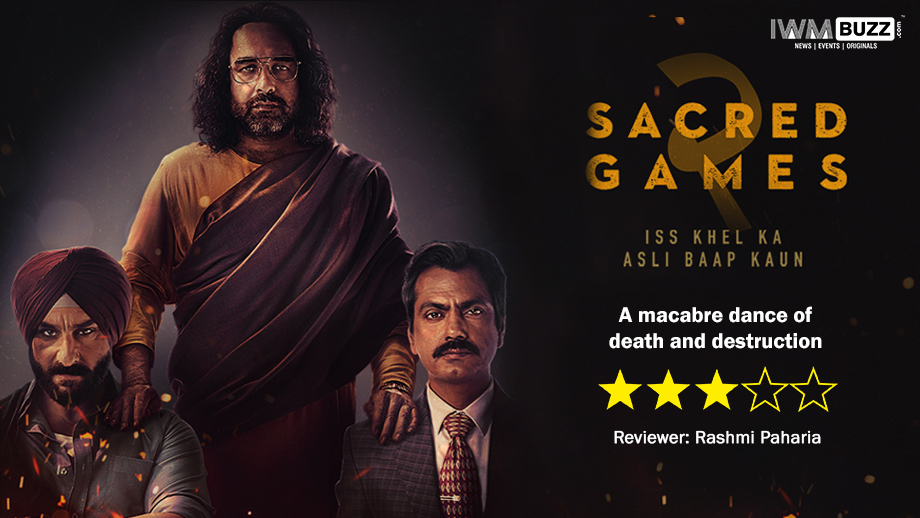“Science has taken us to the moon; religion has flown us into buildings.”
Though the writer of this quote is unknown, there’s something to be said for the utter absolute truth in his words. Coz the repercussions of religious fanaticism couldn’t have been put in better words. Yet, words are puny tools to convey a sentiment. And the least hard-hitting, may be.
It’s when the games people play in the name of religion are painted in the gory colours of blood and mayhem and destruction, that’s when they really deliver a gut punch to the solar plexus, sucking the air out of the lungs and bringing us in direct confrontation with the evil that resides within the human race;evil that comes to the fore whenever religion is invoked to satisfy man’s insatiable lust for power and supremacy.
Sacred Games Season 2 portrays all this and more, in harrowing technicolor and agonizing detail. The magnitude of evil conjured up by mankind in the name of religion, omnipresent throughout the show, makes you recoil in shock and horror. C.S.Lewis once said, “Of all bad men, religious bad men are the worst”. Sacred Games 2 makes the saying come alive in intensely unsettling sequences, choreographing a macabre dance of death and destruction that chills the onlooker to the bone. A mob-lynching scene is particularly terrifying – unnerving in its vividness and brilliant in execution.
So yes, religion takes sole centre-stage in the second season of the wildly popular Netflix show based on Vikram Chandra’s magnum opus of the same name. The story picks up from where it left off in the last episode of Season 1.
In Season 1, Ganesh Gaitonde (Nawazuddin Siddiqui) is dead, having shot his brains out with his own revolver. But before shooting himself, the dreaded gangster drops a spine-chilling hint to his chosen confidante –underachieving Mumbai police constable, Sartaj Singh (Saif Ali Khan) – about a doomsday conspiracy designed to destroy Mumbai. He exhorts Singh to save his beloved city from a massive catastrophe that is set to hit Mumbai in 25 days.
Vikramaditya Motwane returns as the show runner, Anurag Kashyap once again takes the reins to direct the Ganesh Gaitonde track, while Sartaj Singh’s track is directed by Neeraj Ghaywan of Masaan fame. Reliance Entertainment comes on board this season as principal presenter.
Season 2 is not without its flaws though. The show drags in parts, with certain long-drawn sequences slowing down the narrative to an excruciating pace
Season 2, just as Season 1, flits between the past and present – the dead gangster’s life is recreated in vivid flashbacks, while Sartaj Singh’s storyline continues in the present as he races against time to unravel and halt Mumbai’s impending destruction, as portended by Gaitonde. Interspersed with this eerie present is Gaitonde’s past, as he resumes his intriguing storytelling to Sartaj, chronicling his chequered criminal career and taking the narrative forward.
The constant back and forth between past and present is executed fluidly, with nary a discordant note or jerky transition taking away from the slickness of the narrative. What also boggles the mind is the effortless refinement with which both tracks – Kashyap’s and Ghaywan’s are merged – seamlessly – to be presented as one smooth, cohesive entity. It would have completely escaped one’s notice if one didn’t know better.
Season 2 showcases a larger and more magnificent canvas, traversing multiple places in astonishingly diverse lands – Mombasa in Kenya, Dubai, Croatia, and of course, good ol’ Mumbai. There are also a host of new characters introduced into the narrative – RAW biggie, Kusum Devi Yadav (Amruta Prakash); Gujarati druglord, Purshottam (Saanand Verma);Islamic jihadist, Shahid Khan (RanvirShorey)’ and the Palestinian-Jewish BatyaAbelman (Kalki Koechlin).
Gaitonde loyalists Muthu (VikramKochhar) and Bunty (Jatin Sarna) make a comeback, and so does Malcolm (Luke Kenny), the impassive assassin – as intimidating and menacing as ever.
DCP Parulkar (Neeraj Kabi) and PI Majid Khan (Aamir Bashir), State Home Minister Bhonsle (Girish Kulkarni) and IFS officer Trivedi (Chittaranjan Tripathy) continue where they left off.
Season 2 also lends more screen time and further clarity to a number of enigmatic characters from Season 1. Jamila/Zoya’s (Elnaaz Norouzi) back story comes to the fore in Season 2. Foul-mouthed pimp, Jojo Mascarenhas (Surveen Chawla) reappears, this time in a bigger, sassier role and ample screen time to show off her acting wares.
Sartaj Singh’s wife Megha (Anupriya Goenka) also gets an extended outing, and viewers are made privy to the reason for their separation. SIT officer Markand (Sameer Kochhar) is also given much more to do than the first season. Saartaj Singh’s father, cop Dilbagh Singh (Jaipreet Singh) is given more screen space, and we understand better, his motives in helping Gaitonde.
But looming large over everything and everyone else in Season 2 is the character of Guruji (Pankaj Tripathi), Gaitonde’s ‘teesrabaap’. Introduced in the final episode of Season 1, Guruji takes over season 2 in its entirety. He is all-consuming and all-pervading as an ominous presence in the new season – If not physically, then with his silken, hypnotic voice that constantly plays in Gaitonde’s ears, driving him crazy.
Guruji runs a religious commune in Croatia, where spirituality tangos with s*x and drugs in a psychedelic threesome to dazzle its residents into perpetual, hallucinogenic submission. A la Osho, you may say. And you’re spot on with that. And Batya is to him what Ma Anand Sheela was to Osho. Residents, including Gaitonde, Malcolm and Dilbagh Singh (yes, Sartaj’s father is a member of Guruji’s cult), indulge in freewheeling sex, are always high on a drug called Gochi, and are willing subjects that bend to Guruji’s diktats, orchestrating his nefarious designs to change the course of the world.
That clears the air of mystery that surrounded quite a few characters in Season 1. Malcolm, Trivedi, Bhonsle, Dilbagh Singh and several more are all doing what they are at Guruji’s behest. And this is just the tip of the iceberg. Season 2 brims with shattering reveals that turn the world on its head for the protagonists of the series – more specifically, Singh and Gaitonde.
To come back to Guruji, he suffers from the God syndrome, and wants to bring the world back to Satyug, from the Kalyug it has descended into because of greed and religious strife. His solution for the chaos and cacophony of Kalyug is – part or complete annihilation of the world. Quite like Thanos in Avengers: Infinity Wars, you may say. And again, you would be spot on.
And therein lies the mystery of the impending crisis that is to strike Mumbai; which Sartaj Singh must avert at any cost. But our hero has feet of clay. Goaded on by the scarlet-hued Gochi that he’s gotten addicted to, Sartaj gets indoctrinated into the psychedelic notions espoused by Batya and Guruji. Will he, won’t he, that is the question; save Mumbai that is.
As the narrative hurtles towards a gripping climax, viewers are held in suspenseful thrall over the fate of everyone concerned; especially Gaitonde’s. Despite being dead, and us knowing he’s dead, Gaitonde continues to hold our attention in a vice-like grip. We root for him, adore his outrageous guts and his chutzpah, and wallow in his loneliness and vulnerability. Seldom has a character been as all-consuming as this. And the credit for it is absolutely Nawazuddin’s.
The man is outstanding in every scene he features in. Certain scenes are particularly compelling. He is brilliant in the scene where Guruji reinforces his beliefs into a floundering Gaitonde, and Gaitonde proclaims with a roar, “Main Brahma hoon, main Kalki hoon”. Interspersed with this scene is another one that constantly plays on loop in the mind’s eye – the one where Gaitonde reclines in a gory tub in full public view and spews blood with every declaration of being Brahm and Kalki. What an amazing, amazing sequence this one is. And it culminates in a shattering crescendo that leaves one gasping for breath with the raw energy and sheer force emanating from it.
Ganesh Gaitonde’s character arc and consequent transformation is simply breath-taking and the most compelling of the lot. His suave cockiness gives way to anxious vulnerability towards the end, just as his fancy extravagant shirts give way to grave, sombre-coloured kurtas. He visibly ages on screen, not literally, but metaphorically. His stooped shoulders, resigned air, bulging eye-bags that overshadow even those extraordinarily long lashes of his – are tiny details that convey a world of meaning. He sums it up with another of his powerful dialogues – “Maalum pada yeh khel inn sab chut*yon se, aapse, mujhse bada hai…”
More than the story, which is quite trope-ridden, if we may, it is the characters that lend Season 2 its genius. In fact, the varied characters take precedence over everything else. Guruji, with his silkily hypnotic voice, half-closed enigmatic eyes and a beatific half- smile hovering on his charismatic countenance, is a superbly etched out character. He is evil, but never lets on his evilness. He is menacing,but no one catches on to his menacing machinations.
Pankaj Tripathi is outstanding in his portrayal of Guruji. The man never ceases to surprise us with his uncanny chameleon-esque skill to transform into the character he plays. His is a consummate talent, which he leverages to the hilt here.
Another brilliant character is that of Kusum Devi Yadav’s. The lady controls Gaitonde with iron-clad will, reducing him to being a mere puppet to her designs. Yes, she is the lady who succeeds in subverting the mighty Gaitonde, and making him submit to her will. It is an intriguing role and Amruta Prakash plays it with flawless precision.
Jojo, Megha, Bunty, Muthu, even the caricaturish Purshottam, are the other well-etched out characters. Then there are the dialogues. Dazzling would just about begin to describe them. Provocative, powerful and paeans-worthy are the dialogues of Sacred Games Season 2, and they’ll be quoted for a long time to come, mark our words.
Lastly are the subtlenuances that pop up in the narrative, shocking us into quiet contemplation. The lynching of Saad, a Muslim youngster, is heart-wrenching and one that’ll stay with you for a long long time. That it holds a mirror to the religious mayhem in the present state of affairs makes the scene all the more profound.
When Saad’s brother declares to police officer Majid Khan, “Musalman kou thane bulane ke liye aapko wajah chahiye?”, the jibe hits home, hard. Or when Majid Khan points out the discrimination meted out to him by virtue of his being Muslim, it makes us think.There are several such poignant sequences and lines in the series that compel one to ponder. Sacred Games 2 is a damning critique of the religious divide that grips the country in the 21st century.
The ingenuity with which it is woven into the storyline is what makes the show a slow burn and a worthy watch. Oh, and one more thing – the scene where Guruji outlines his plan to take the world back to Satyug from Kalyug to Gaitonde, has the word ‘GENOCIDE’ written in plain view on a stone edifice just behind Guruji, to be read and mused over. Chew that!
Season 2 is not without its flaws though. The show drags in parts, with certain long-drawn sequences slowing down the narrative to an excruciating pace. Also, several happenings lack logic and reasoning – Malcolm’s suicide, for instance. We thought and thought, but couldn’t come up with a plausible explanation for it.
There are several other sequences that pop up randomly but have nowhere to go beyond and die a natural death, thereby making them redundant and unnecessary to the story – the partition saga and the hint that Shahid Khan and Sartaj Singh are related by blood, for example. Shahid Khan dies without that particular angle being explored, thus making it an exercise in futility.
We can only conclude that sequences such as the ones above have been woven in, only to add to the sensational value. Which is a far cry from Season 1, where not a single shot was unwanted or out of place or added just for the heck of it. In that sense, we must say that Season 1 was a tad better in terms of storytelling brilliance, while Season 2 is better in characterization.
All said and done, Sacred Games Season 2 is a superb watch, though not as compelling as Season 1. While we couldn’t tear our eyes away from the screen in season 1, Season 2 definitely has some yawn-inducing moments.
Since we’d given 4/5 to Sacred Games Season 1, and since the latest season is certainly a notch below that, we must therefore give Sacred Games Season 2 a rating of 3/5.











